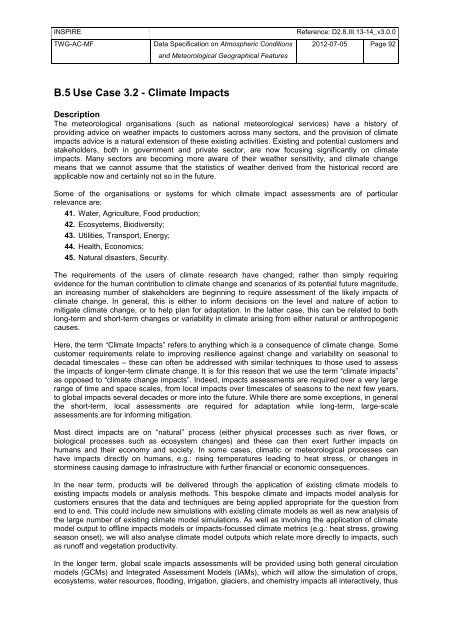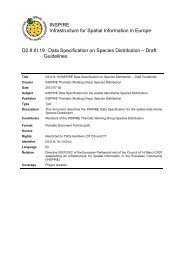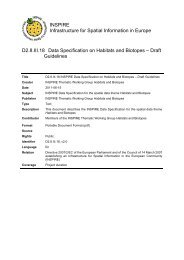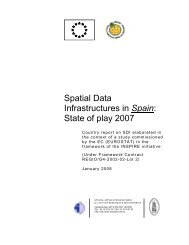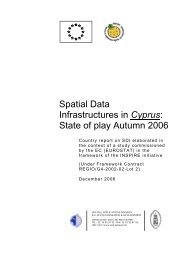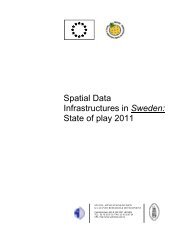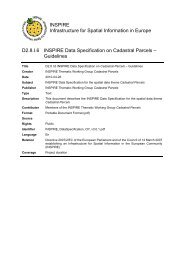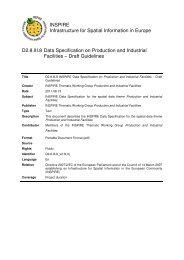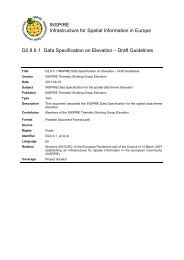Data Specification on Atmospheric Conditions and ... - Inspire - Europa
Data Specification on Atmospheric Conditions and ... - Inspire - Europa
Data Specification on Atmospheric Conditions and ... - Inspire - Europa
Create successful ePaper yourself
Turn your PDF publications into a flip-book with our unique Google optimized e-Paper software.
INSPIRE Reference: D2.8.III.13-14_v3.0.0<br />
TWG-AC-MF <str<strong>on</strong>g>Data</str<strong>on</strong>g> <str<strong>on</strong>g>Specificati<strong>on</strong></str<strong>on</strong>g> <strong>on</strong> <strong>Atmospheric</strong> C<strong>on</strong>diti<strong>on</strong>s<br />
<strong>and</strong> Meteorological Geographical Features<br />
B.5 Use Case 3.2 - Climate Impacts<br />
2012-07-05 Page 92<br />
Descripti<strong>on</strong><br />
The meteorological organisati<strong>on</strong>s (such as nati<strong>on</strong>al meteorological services) have a history of<br />
providing advice <strong>on</strong> weather impacts to customers across many sectors, <strong>and</strong> the provisi<strong>on</strong> of climate<br />
impacts advice is a natural extensi<strong>on</strong> of these existing activities. Existing <strong>and</strong> potential customers <strong>and</strong><br />
stakeholders, both in government <strong>and</strong> private sector, are now focusing significantly <strong>on</strong> climate<br />
impacts. Many sectors are becoming more aware of their weather sensitivity, <strong>and</strong> climate change<br />
means that we cannot assume that the statistics of weather derived from the historical record are<br />
applicable now <strong>and</strong> certainly not so in the future.<br />
Some of the organisati<strong>on</strong>s or systems for which climate impact assessments are of particular<br />
relevance are:<br />
41. Water, Agriculture, Food producti<strong>on</strong>;<br />
42. Ecosystems, Biodiversity;<br />
43. Utilities, Transport, Energy;<br />
44. Health, Ec<strong>on</strong>omics;<br />
45. Natural disasters, Security.<br />
The requirements of the users of climate research have changed; rather than simply requiring<br />
evidence for the human c<strong>on</strong>tributi<strong>on</strong> to climate change <strong>and</strong> scenarios of its potential future magnitude,<br />
an increasing number of stakeholders are beginning to require assessment of the likely impacts of<br />
climate change. In general, this is either to inform decisi<strong>on</strong>s <strong>on</strong> the level <strong>and</strong> nature of acti<strong>on</strong> to<br />
mitigate climate change, or to help plan for adaptati<strong>on</strong>. In the latter case, this can be related to both<br />
l<strong>on</strong>g-term <strong>and</strong> short-term changes or variability in climate arising from either natural or anthropogenic<br />
causes.<br />
Here, the term ―Climate Impacts‖ refers to anything which is a c<strong>on</strong>sequence of climate change. Some<br />
customer requirements relate to improving resilience against change <strong>and</strong> variability <strong>on</strong> seas<strong>on</strong>al to<br />
decadal timescales – these can often be addressed with similar techniques to those used to assess<br />
the impacts of l<strong>on</strong>ger-term climate change. It is for this reas<strong>on</strong> that we use the term ―climate impacts‖<br />
as opposed to ―climate change impacts‖. Indeed, impacts assessments are required over a very large<br />
range of time <strong>and</strong> space scales, from local impacts over timescales of seas<strong>on</strong>s to the next few years,<br />
to global impacts several decades or more into the future. While there are some excepti<strong>on</strong>s, in general<br />
the short-term, local assessments are required for adaptati<strong>on</strong> while l<strong>on</strong>g-term, large-scale<br />
assessments are for informing mitigati<strong>on</strong>.<br />
Most direct impacts are <strong>on</strong> ―natural‖ process (either physical processes such as river flows, or<br />
biological processes such as ecosystem changes) <strong>and</strong> these can then exert further impacts <strong>on</strong><br />
humans <strong>and</strong> their ec<strong>on</strong>omy <strong>and</strong> society. In some cases, climatic or meteorological processes can<br />
have impacts directly <strong>on</strong> humans, e.g.: rising temperatures leading to heat stress, or changes in<br />
storminess causing damage to infrastructure with further financial or ec<strong>on</strong>omic c<strong>on</strong>sequences.<br />
In the near term, products will be delivered through the applicati<strong>on</strong> of existing climate models to<br />
existing impacts models or analysis methods. This bespoke climate <strong>and</strong> impacts model analysis for<br />
customers ensures that the data <strong>and</strong> techniques are being applied appropriate for the questi<strong>on</strong> from<br />
end to end. This could include new simulati<strong>on</strong>s with existing climate models as well as new analysis of<br />
the large number of existing climate model simulati<strong>on</strong>s. As well as involving the applicati<strong>on</strong> of climate<br />
model output to offline impacts models or impacts-focussed climate metrics (e.g.: heat stress, growing<br />
seas<strong>on</strong> <strong>on</strong>set), we will also analyse climate model outputs which relate more directly to impacts, such<br />
as runoff <strong>and</strong> vegetati<strong>on</strong> productivity.<br />
In the l<strong>on</strong>ger term, global scale impacts assessments will be provided using both general circulati<strong>on</strong><br />
models (GCMs) <strong>and</strong> Integrated Assessment Models (IAMs), which will allow the simulati<strong>on</strong> of crops,<br />
ecosystems, water resources, flooding, irrigati<strong>on</strong>, glaciers, <strong>and</strong> chemistry impacts all interactively, thus


